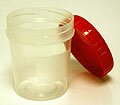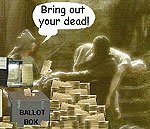Saturday, May 13, 2006
Bill would drug test Pa. political candidates
 While there are no bills pending in Pennsylvania's Legislature for sweeping campaign finance reform, there are nearly 100 bills dealing with elections and political campaigns. Some are darn interesting.
While there are no bills pending in Pennsylvania's Legislature for sweeping campaign finance reform, there are nearly 100 bills dealing with elections and political campaigns. Some are darn interesting.One of them, H.B. 1434, would require that any politician seeking a paid office in Pennsylvania would have to submit to a drug test within 30 days of filing a nominating petition.
The bill was introduced on April 19 by state Rep. Harold James, a Philadelphia Democrat and retired police officer, and was immediately supported by 21 other state representatives. It was referred to the House state government committee a week later.
 "I believe we should step forward and send a message to young people across the state that any kind of illegal drug use is devastating," James said. "In a time where the honesty and integrity of elected officials is often questioned, I feel all public officials should take it upon themselves to demonstrate the leadership qualities that got them elected in the first place."
"I believe we should step forward and send a message to young people across the state that any kind of illegal drug use is devastating," James said. "In a time where the honesty and integrity of elected officials is often questioned, I feel all public officials should take it upon themselves to demonstrate the leadership qualities that got them elected in the first place."However, James' bill does not specify what type of test - blood, urine or hair - candidates might have to take, require that the test's results be made public or specify what happens if a candidate tests positive.
Other interesting bills include:
S.B. 170 would eliminate primary voting for lieutenant governor candidates and let the gubernatorial primary winners pick their own runningmates within 90 days of the general election.
H.B. 2274 would require any state legislative candidate to be a resident of the district he plans to run from for at least one year.
H.B. 305, would require all employers in Pennsylvania to give state residents a paid half-hour off from work on election day so they can vote. Employers who refuse could be hit with a summary offense and fined $250.
S.B. 201 would allow two days for voting in elections.
H.B. 175 would outlaw so-called "persuasive polls," designed to spread negative, derogatory or misinformation about a candidate, not gauge public opinion. Violators who use the phone to do it could be hit with a perjury charge.
S.B. 526 would require candidates to say who paid for any e-mails, Internet ads, faxes and automatic dialing/announcing campaigns.
H.B. 332 would prohibit anyone contacting Pennsylvania residents by phone between 9 p.m. and 8 a.m. to conduct an advocacy campaign or "push poll." All callers would also have to disclose the purpose of the call, the name of the telemarketer or telemarketing business and what issue the telemarketer or telemarketing business is advocating.
Finally, H.B. 334 would require funeral directors to report the name, date of birth, date of death and address of every deceased person to the state Election Commission.
The last bill comes too late to help state Rep. Michael Diven, who not only included James J. Bradley Jr.'s signature on his nominating petition for reelection this year, he sent him a birthday card in April.
Unfortunately, Bradley, of Baldwin Township, Allegheny County, died Dec. 5, 2002. He wasn't the only dead person to support Diven. Fake signatures for five other deceased district residents also appeared on his petition.
 Diven, who switched from being a Democrat to a Republican last year, blamed a lazy campaign worker and an out-of-date mailing list from the House Republican Caucus for the mistakes and quit the primary race. He did not, however, rule out a run in the general election as a write-in or an independent candidate.
Diven, who switched from being a Democrat to a Republican last year, blamed a lazy campaign worker and an out-of-date mailing list from the House Republican Caucus for the mistakes and quit the primary race. He did not, however, rule out a run in the general election as a write-in or an independent candidate.Diven apologized in person to Bradley's widow last Sunday. However, an assistant county solicitor told elections boss Mark Wolosik that the matter should be referred to police for an investigation.
TODAY'S MAIN ISSUE: CAMPAIGN FINANCE REFORM
 |
| 
This Week's Rants | The Daily Rant Archives

This work is licensed under a Creative Commons Attribution 2.5 License.

This work is licensed under a Creative Commons Attribution 2.5 License.


